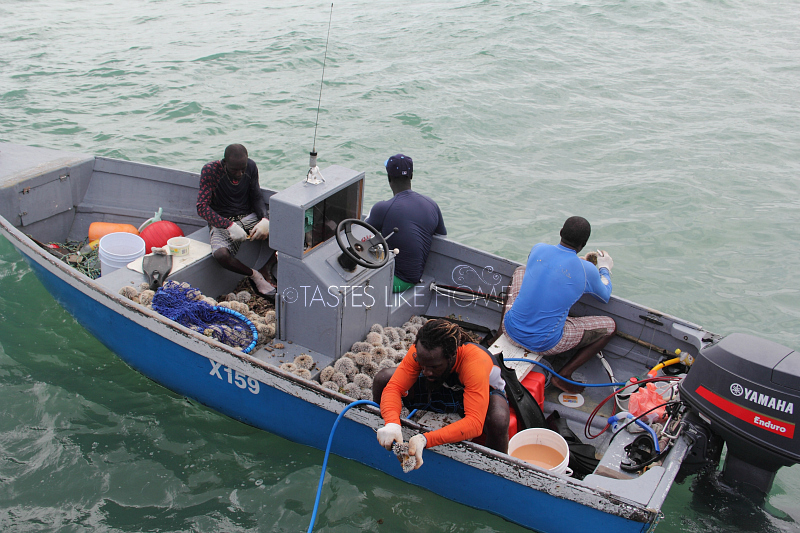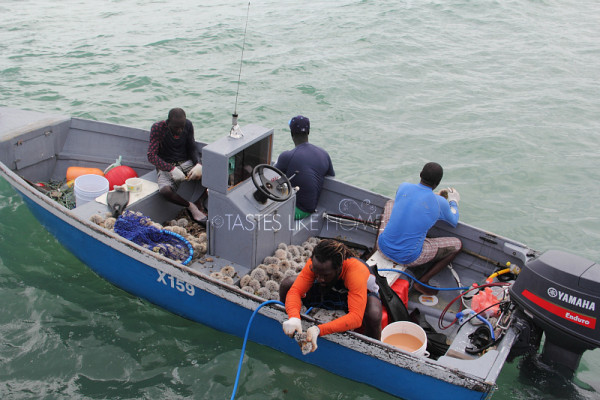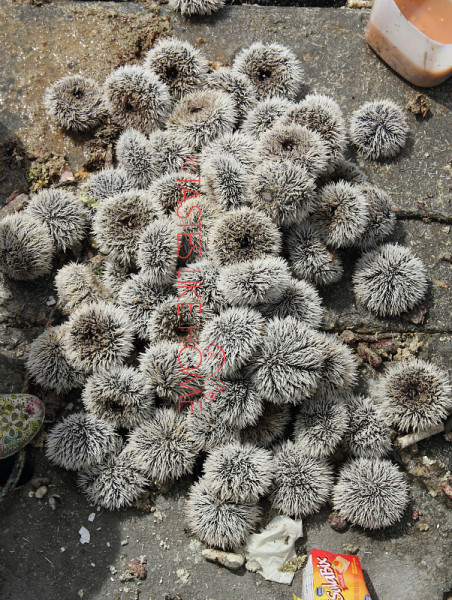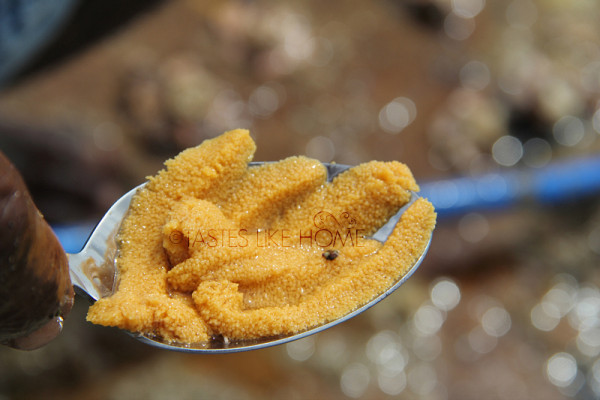Hi Everyone, The heated oil shimmers. Onions, fresh herbs and chopped hot peppers hit the pan and sizzle. As the onions soften, the medley of herbs releases its flavour that swirls around the air in the kitchen. The brightly orange-coloured sea eggs slide smoothly from the container quieting the pan. In a matter of seconds the edges start to firm up; the eggs are so tender. A sprinkling of ground black pepper and salt along with a few gentle turns of the wrist, some folding if you like and the cooking is done. You have a pan full of tender, flavourful, sweet, sea eggs. Would you like yours with rice or bread?
Barbadians call them sea eggs, others sea urchin and the Japanese call them ‘uni’ (oo-nee). For the purpose of the column, I’ll refer to them as the Bajans do – sea eggs. The white-spine sea egg is one of the 950 known species of sea urchins. Barbados, along with Grenada, St Vincent and the Grenadines, St Lucia and Martinique are the countries in the Eastern Caribbean that commercially harvest sea eggs. The spiny creatures are found at depths of 20-feet on sea grass beds and amidst shallow coral reefs, which they use as camouflage. Encased in a hard shell, protected by sharp needle spines are 5 rows of roe, brightly coloured, ranging from deep yellow to orange. That’s the prize. That’s a Bajan delicacy. That is what is fondly known as Bajan Caviar.
 For as long as Barbadians can remember, sea eggs have been a part of their diet as a seasonal treat. This once plentiful seafood that had a regular, yearly, clock-like season – September to December – has been steadily in decline. And it didn’t just happen. According to the Barbados Fisheries Division, a bill was taken to Parliament in 1900 recommending the first 3-year harvest ban to protect the sea eggs from poaching and over harvesting. Through the years the ban would fluctuate depending on the replenished stock. The 4-month season would also be adjusted to accommodate the dwindling stock size.
For as long as Barbadians can remember, sea eggs have been a part of their diet as a seasonal treat. This once plentiful seafood that had a regular, yearly, clock-like season – September to December – has been steadily in decline. And it didn’t just happen. According to the Barbados Fisheries Division, a bill was taken to Parliament in 1900 recommending the first 3-year harvest ban to protect the sea eggs from poaching and over harvesting. Through the years the ban would fluctuate depending on the replenished stock. The 4-month season would also be adjusted to accommodate the dwindling stock size.
In an article written by Tony Cozier in 1977, ‘Sea Urchins Prickly Problems in Barbados’ carried by the Virgin Islands Daily News, then Attorney General (now Sir) Henry Ford pleaded with fisherfolk who were openly flouting the law by poaching the sea eggs outside of the season. He explained, “The sea egg, like so many other creatures that live in the sea, has a cycle of breeding, fertilization and growth through feeding to maturity.” In that same article, an official from the Ministry of Agriculture was quoted saying, “If fishermen continue to dive the sea egg during the legal closed season without the government doing anything about it, I can foresee the day when it will become in such short supply that it won’t be an available commodity any longer.” That was 38 years ago and today it rings true and can become a reality if we are not careful.
In addition to the out-of-season poaching and harvesting, fishermen who consult with the fisheries division believe that the decline in stock size (of sea eggs) that started around the mid-70s to early 80s, may have to do with various forms of pollution. They believe that pollution caused a reduction in algae, which is what sea eggs feed on. Others believe that in addition to pollution, the erosion of the coastline has contributed to the decline in the sea egg population. Migration may be another cause.
On Wednesday September 23, 2015, the Barbados Ministry of Fisheries temporarily lifted an 11-year ban on harvesting sea eggs. From October 1 – 30, 2015, fisherfolk were allowed to dive, harvest and sell sea eggs. Upon hearing this news, more than 400 divers registered, applied for, and were granted licenses to harvest sea eggs.
For many – fisherfolk and consumers – it has been a rewarding month. For the fisherfolk, they can say that they made a ‘killing’. They retailed the sea eggs for US$30 – US$40 for an approximate 1-pound container. For consumers, it was a delicacy in which to indulge and treat themselves and I do mean that given the princely price demanded. I overheard older fishermen saying that the sea egg divers were asking (selling) for too much money. While many people bought weekly containers of sea eggs, many didn’t because they simply couldn’t afford to do so. Demand for sea eggs has always outstripped supply and even though one always had to pay more for this Bajan delicacy, never was the pricing this high.
The lifting of the ban for only one month says that there is a not a huge stock of sea eggs to be harvested, however, given that over 400 divers have been granted licenses, there is bound to be over harvesting. It means that even the sea eggs that are not fully matured, with very little roe, will also be netted.
Sea eggs are rich in protein. To get to the roe, the shells are cracked, pried open, and the roe scooped out with a spoon. Many people enjoy sea eggs raw; they are inherently sweet and are best when not overcooked. The eggs are delicate; they cook up quickly and should be cooked on low heat. Thought to be an aphrodisiac, the ‘roe’ of the sea eggs is actually the urchin’s gonads, its sexual, reproductive glands. You see the obvious connection to perceived aphrodisiac powers?
I ate my sea eggs as most Bajans do – with white rice.
Cynthia














